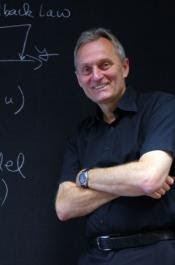Speaker
Description
From the approximation of complex-valued functions to the reduction of dynamical systems, Hardy spaces provide a powerful framework for the analysis and construction of optimal rational approximants. One of the most widely used methods in linear model order reduction is the iterative rational Krylov algorithm (IRKA), designed to construct rational interpolants that satisfy the first order optimality conditions introduced by Meier and Luenberger. In this work, we explore possible extensions of the H2 optimal model reduction framework to a broader class of domains in the complex plane. In particular, two different approaches will be discussed: in the first case, the reduced order models are assumed to have a rational structure; in the second case, the assumption is that a rational structure is obtained only after composition with a conformal map which relates to the underlying domain. For both approaches, we examine connections between H2-like optimality conditions and the Schwarz function from both theoretical and numerical perspectives.

